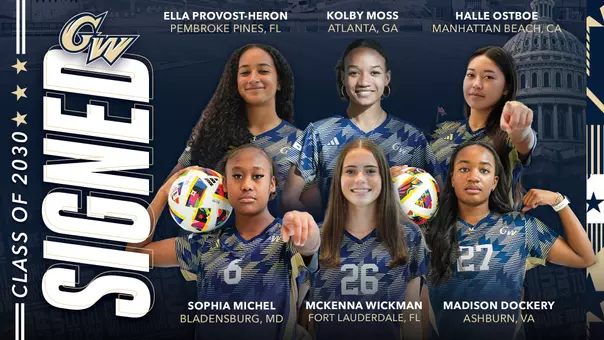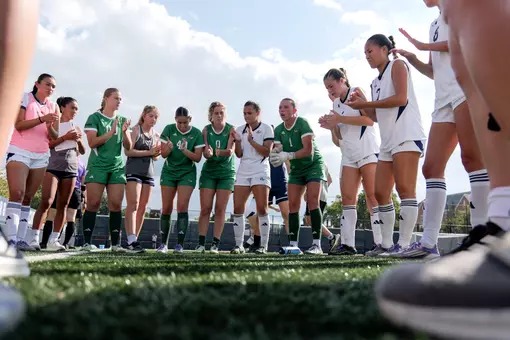George Washington University Athletics

Sitting Down with Michelle Demko
8/10/2018 2:35:00 PM | Women's Soccer
Demko details her collegiate and professional career, coaching style and goals for the 2018 season
The George Washington women's soccer team will have a new look this season as head coach Michelle Demko embarks on her first season in the Buff and Blue.
Demko, who has experience coaching at the highest levels collegiately and internationally, comes to GW after an eight-year stint as head coach at UNC Asheville, where she built a competitive program that increased its win total in each of her first six seasons at the helm.
Before entering the coaching ranks, Demko had a successful career playing for Maryland as a two-year captain and later as a professional with the Philadelphia Charge in the WUSA. Her time in the WUSA followed a three-year run playing professionally in Germany in the Frauen Bundesliga for the SC Klinge Seckah, FSV Frankfurt and Bayern Munich.
Demko sat down with GWsports.com to discuss her collegiate and professional career, coaching style and goals for the 2018 season.
You have experience playing soccer collegiately and professionally both in the U.S. and internationally. How did these experiences shape you as a player and as a coach? What lessons did you learn and how do you hope to integrate them into your team at GW?
As a player, being a professional helped me learn and understand what it means to train properly and take care of your body. Successful athletes make time to create a routine where physical needs become a priority. Stretching, lifting, extra reps, hydration and sleep all have a direct relationship on performance.
As a coach, having been in a professional environment taught me the importance of team management and trust. Trust is built through meaningful relationships. This also leads to open communication, which is critical to creating a culture of success. There are many ways to accomplish the same result. This has allowed me to become open to hearing from the players and listening to their suggestions or point of view.
Why did you decide to become a soccer coach?
Originally I wanted to go into coaching because of the amount of love and passion I have for the game of soccer. Coaching was a way I didn't have to step away from the game. It was a great way for me to continue to be involved in the game that gave me so much. My older self realizes soccer has become the vehicle for me to have the opportunity to directly impact the lives of young people, to help create environments that help them grow into the best people they can be on and off the field. Sports are a great way to have experiences prepare individuals for life. Lessons like accountability, investment, commitment, teamwork, goal setting and leadership will be used for the rest of their lives. That's my biggest "why" to help young people realize and reach their potential and understand what true investment and commitment to a team looks like.
Who are the people you learned from and whose knowledge do you apply day-in and day-out?
I consider myself a life learner. I am constantly reading books, listening to podcasts and having conversations with coaches to pick their brains on how they arrived at success and also what a successful program looks like to them. My college coaches, April Heinrichs and Jill Ellis, were the biggest influences on me to go into coaching. They prioritized developing individual relationships with each player in our program, and that investment was a game changer for all of us. I also feel very fortunate to have been in high-level environments where team management and leadership were critical to developing a success environment. I have been coached by several US Women's National Team and Youth National Team coaches as well as the Swedish Women's National Team coach and the German Women's National Team coach. Each of these coaches had a different way of teaching a specific topic, but all of them had the same foundation: leadership and investment in individual relationships. This is a huge part of who I am and how I am on and off the field.
How would you explain your coaching style?
My coaching style is full or energy, positivity and encouragement. I will be the loudest one on the field celebrating a great attack or hard tackle. Players should be celebrated as often as they can when they earn it, so they can understand what they bring is valuable and important to building our program. I believe in getting the best out of people by holding them to standards they set and agree upon as a team. My philosophy is that this is a player-driven program. Everyone has to agree on what is acceptable and unacceptable to attain the goals we speak about. I am a big risk taker on the field, which is where the importance of developing trust comes into play. In order to risk everything on the field, we have to have certainty every player is winning their individual battle if we are going to have dynamic movement on the field at every opportunity.
You had a long and successful run at UNC-Asheville, so what was it about GW that made this the right opportunity for you?
GW is the total package for me. It's a university and athletic department that truly invests in the person-first model. I've been here for a short period of time, and I love what I hear from our athletics director Tanya Vogel in that how we treat people will be our biggest recruiting tool. College athletics has become more of a business as ever, but to have the leader of our athletic department remind us repeatedly about determination, commitment and respect tells me at the core of this athletic department are fundamental values for ourselves and our programs, and for me, that was huge in taking this job.
Academically, students who graduate form GW have an opportunity be very successful because they have an awareness on a different level being in a city that is diverse and where policies are made that directly relate to global change. Due to our academic prestige, this university sells itself to students who want an opportunity to live their best potential.
Athletically, I have known about this program since I played against GW when I was a student-athlete at University of Maryland. Playing GW was one of our toughest games each year. I knew we were in for a 90-minute fight, and it was going to come down to which team could make fewer mistakes. My vision and goal for this program is to play that brand of GW women's soccer, a relentless pursuit of excellence. This current group is hungry for success and is very talented. I have been impressed with their commitment to showing up and training hard wanting to get better.
Besides having a favorable record at the end of this season, what do you hope to accomplish in your first year at GW?
My hope for this first year at GW is that we create an environment where being above the line is the only acceptable way to live, play and have relationships. To understand success comes from encouragement, investment, and challenging each other to be the best version of themselves. Making the right decisions based on whom they love and what matters most will become our team culture.
Demko, who has experience coaching at the highest levels collegiately and internationally, comes to GW after an eight-year stint as head coach at UNC Asheville, where she built a competitive program that increased its win total in each of her first six seasons at the helm.
Before entering the coaching ranks, Demko had a successful career playing for Maryland as a two-year captain and later as a professional with the Philadelphia Charge in the WUSA. Her time in the WUSA followed a three-year run playing professionally in Germany in the Frauen Bundesliga for the SC Klinge Seckah, FSV Frankfurt and Bayern Munich.
Demko sat down with GWsports.com to discuss her collegiate and professional career, coaching style and goals for the 2018 season.
You have experience playing soccer collegiately and professionally both in the U.S. and internationally. How did these experiences shape you as a player and as a coach? What lessons did you learn and how do you hope to integrate them into your team at GW?
As a player, being a professional helped me learn and understand what it means to train properly and take care of your body. Successful athletes make time to create a routine where physical needs become a priority. Stretching, lifting, extra reps, hydration and sleep all have a direct relationship on performance.
As a coach, having been in a professional environment taught me the importance of team management and trust. Trust is built through meaningful relationships. This also leads to open communication, which is critical to creating a culture of success. There are many ways to accomplish the same result. This has allowed me to become open to hearing from the players and listening to their suggestions or point of view.
Why did you decide to become a soccer coach?
Originally I wanted to go into coaching because of the amount of love and passion I have for the game of soccer. Coaching was a way I didn't have to step away from the game. It was a great way for me to continue to be involved in the game that gave me so much. My older self realizes soccer has become the vehicle for me to have the opportunity to directly impact the lives of young people, to help create environments that help them grow into the best people they can be on and off the field. Sports are a great way to have experiences prepare individuals for life. Lessons like accountability, investment, commitment, teamwork, goal setting and leadership will be used for the rest of their lives. That's my biggest "why" to help young people realize and reach their potential and understand what true investment and commitment to a team looks like.
Who are the people you learned from and whose knowledge do you apply day-in and day-out?
I consider myself a life learner. I am constantly reading books, listening to podcasts and having conversations with coaches to pick their brains on how they arrived at success and also what a successful program looks like to them. My college coaches, April Heinrichs and Jill Ellis, were the biggest influences on me to go into coaching. They prioritized developing individual relationships with each player in our program, and that investment was a game changer for all of us. I also feel very fortunate to have been in high-level environments where team management and leadership were critical to developing a success environment. I have been coached by several US Women's National Team and Youth National Team coaches as well as the Swedish Women's National Team coach and the German Women's National Team coach. Each of these coaches had a different way of teaching a specific topic, but all of them had the same foundation: leadership and investment in individual relationships. This is a huge part of who I am and how I am on and off the field.
How would you explain your coaching style?
My coaching style is full or energy, positivity and encouragement. I will be the loudest one on the field celebrating a great attack or hard tackle. Players should be celebrated as often as they can when they earn it, so they can understand what they bring is valuable and important to building our program. I believe in getting the best out of people by holding them to standards they set and agree upon as a team. My philosophy is that this is a player-driven program. Everyone has to agree on what is acceptable and unacceptable to attain the goals we speak about. I am a big risk taker on the field, which is where the importance of developing trust comes into play. In order to risk everything on the field, we have to have certainty every player is winning their individual battle if we are going to have dynamic movement on the field at every opportunity.
You had a long and successful run at UNC-Asheville, so what was it about GW that made this the right opportunity for you?
GW is the total package for me. It's a university and athletic department that truly invests in the person-first model. I've been here for a short period of time, and I love what I hear from our athletics director Tanya Vogel in that how we treat people will be our biggest recruiting tool. College athletics has become more of a business as ever, but to have the leader of our athletic department remind us repeatedly about determination, commitment and respect tells me at the core of this athletic department are fundamental values for ourselves and our programs, and for me, that was huge in taking this job.
Academically, students who graduate form GW have an opportunity be very successful because they have an awareness on a different level being in a city that is diverse and where policies are made that directly relate to global change. Due to our academic prestige, this university sells itself to students who want an opportunity to live their best potential.
Athletically, I have known about this program since I played against GW when I was a student-athlete at University of Maryland. Playing GW was one of our toughest games each year. I knew we were in for a 90-minute fight, and it was going to come down to which team could make fewer mistakes. My vision and goal for this program is to play that brand of GW women's soccer, a relentless pursuit of excellence. This current group is hungry for success and is very talented. I have been impressed with their commitment to showing up and training hard wanting to get better.
Besides having a favorable record at the end of this season, what do you hope to accomplish in your first year at GW?
My hope for this first year at GW is that we create an environment where being above the line is the only acceptable way to live, play and have relationships. To understand success comes from encouragement, investment, and challenging each other to be the best version of themselves. Making the right decisions based on whom they love and what matters most will become our team culture.
GW Volleyball Recap vs IU INDY (09/13/24)
Monday, September 16
Then & Now: Women's Soccer
Tuesday, July 19
GW Water Polo vs Johns Hopkins
Thursday, October 14
GW Water Polo vs Fordham
Thursday, October 14



















